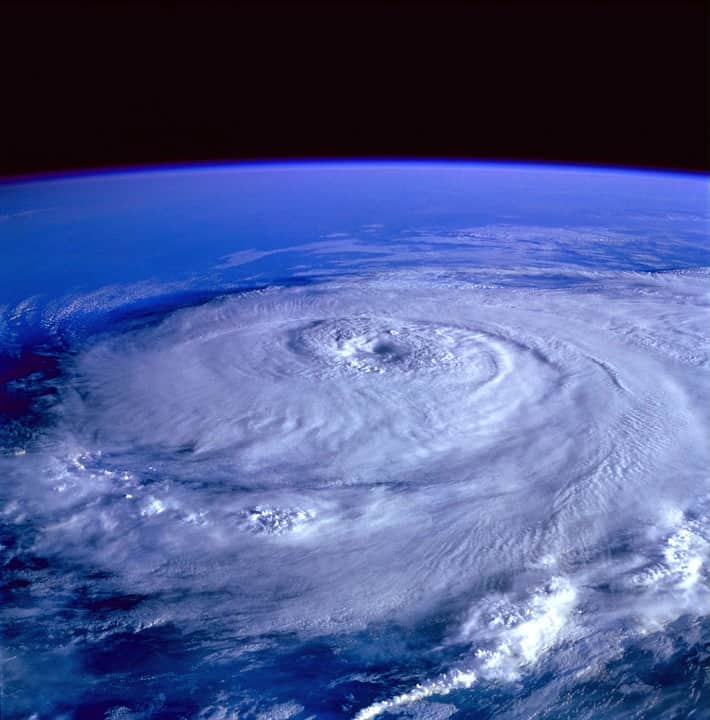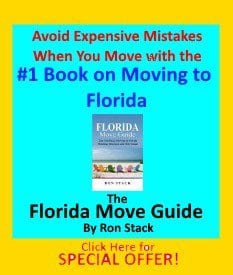Here’s a free preview of the #1 book on moving to Florida as it answers the question…
What’s it like when you live in Florida and a hurricane is heading your way?
Begin the “Florida Move Guide” FREE Preview……………..
You Can’t Know This Until You Live it
You have just moved to Florida after selling your comfortable home up north that you’ve had for years. It’s been a couple of months since the move, and your new place is finally starting to feel like home. The first month was hectic. It was lot of work setting up a new home. Back home, your family would have helped you move, but you live too far away for that now.
It’s a beautiful evening. You decide to relax while watching a TV show with your wife before going to bed. Suddenly, the show is interrupted for a special emergency update. The National Hurricane Center has moved the “cone of uncertainty” of an approaching hurricane over your area. Worse yet, a hurricane hunter aircraft now reports the storm offshore has strengthened to a category two and further strengthening is expected. They also report that growing into the most destructive category 5 is not impossible as this hurricane picks up strength from the warm coastal waters just before landfall. They expect it to hit land the day after tomorrow. Mandatory evacuations have just been announced for your area tomorrow starting at eight o’clock in the morning. Huh?
Forced to Leave Your Home
You are told you should prepare to leave immediately and secure your home before you do. They again warn that this is a mandatory evacuation. If you leave too late, the winds may down trees and power lines and prevent you from getting out. They warn you that if you choose to stay, any call for help does not have to be legally responded to because doing so would put the few remaining emergency personnel at risk. That is why you must leave.
All of a sudden, it hits you. For the first time in your life, you are being ordered to leave your home. Where will you go? How long will you be gone? Will your home still be here when you return?
It’s getting late. It’s dark outside but it’s still hot and humid. Like most of Florida, in this part of paradise you chose for retirement, September still means hot, humid nights. You would be attacked by swarms of mosquitoes if you went outside now and started putting up your hurricane shutters. You made sure the house you bought came with them, but you’ve been too busy moving that you haven’t had time to figure out how to put them up. You now wonder if you even have the tools needed. How heavy are those metal things anyway? It’s supposed to be ninety-three degrees and humid tomorrow, how long will it take?
You have so much to do before you pack up and leave, but it’s getting late and you are both tired and stressed. You both agree on getting a good night’s sleep and starting early in the morning on what must be done. You turn in.
This news has upset your spouse so much she says she can’t sleep and might as well start packing. This is difficult for her. What precious items do you take, and what do you leave behind that you may never see again? There are far too many family pictures, heirlooms and other prized sentimental possessions to fit everything in the car.
No Place to Go
You decide to make reservations for a place to stay safe from the storm. After trying online and then by phone, you give up. With almost half a million people evacuating with you, there are no rooms left anywhere within a couple hundred miles. The travel agency promises to call if they can come up with anything.
Gas! You’ve heard of gas shortages happening when all those extra cars are on the road. You tell your wife you’re going to fill up now. It’s late, and maybe there won’t be any lines. You will be right back.
As you get close to the nearest gas station, you see long lines have already formed. You call home to say it’s going to take a while, but you’ll be home as soon as you can.
As you sit in line, you think about all the things you have to do tomorrow. Put up the hurricane shutters. Move all the lawn ornaments, lanai furniture and anything else that might become a projectile when picked up by 100+ mph winds, and put them into the garage. Where will you put it all? You’re tired, and the more you think about it, the more stress you feel.
The horror of living through another hurricane season with the threat of evacuations or total destruction of your home is one of the main reasons given for leaving the state. Most have never experienced this while on vacation here. It’s something most prospective Floridians never think about. The truth is, even those who considered it couldn’t imagine what it is really like to be under threat six months a year, every year of losing everything you have. You have to live here and experience it to realize the toll it can take. That is how most of the issues that force people to leave Florida work. You really don’t realize what it’s like until you live here and are forced to go through it.
Hurricane season starts June 1st and ends November 30th. The hype of danger by the media starts even before the season does. It starts with warnings to get your “hurricane kit” together. When a hurricane hits, it can destroy thousands of homes, but it can also knock out power and utilities for a million people, far away from the worst destruction. That’s why you need this kit. Bottled water because you won’t get it from your spigot after the storm hits. Canned food because the stores won’t be open and the refrigerators won’t work. Flashlights, batteries and candles because there won’t be any power for light. The worst part, hurricane season happens during Florida’s six months of hot, humid summer, and unless you have a whole house generator and fuel, living without AC is barbaric. The point is to be prepared to live without access to food, water, electric and anything you might want from a store for weeks or months.
How Hurricane Sandy That Hit the Northeast in 2012 Compares
The hurricane that slammed the coastal areas of New Jersey and New York and left many without power in numerous states lost its category 1 hurricane status just before landfall. Florida regularly gets hit by category 2-5 storms that are far more powerful and destructive than Sandy.
Evacuations Ordered More Often
Evacuations can be even worse than hurricanes, because although your Florida home may never be leveled by a hurricane, you may have to go through multiple evacuations in certain years. They are more likely now, after Hurricane Katrina devastated New Orleans in 2005. Evacuations prior to that came late or not at all. They failed to order widespread evacuations prior to hurricane Katrina making landfall. That storm surprised emergency planners and people suffered. After the world watched days of TV footage showing thousands of desperate citizens trapped in the Superdome without adequate food, water and restroom facilities for a long period of time, the authorities now err on the side of caution. You are now less likely to be in your home when a hurricane hits which is a good thing, but you are also more likely to be told you must evacuate and leave it.
I’ve seen the aftermath of a hurricane up close with my own eyes. You can be trapped in a home with no air conditioning in the Florida summer heat and humidity. Trapped because the streets will be littered with downed trees and telephone poles, electrical wires and roofs that make using your car or truck to get out impossible.
For thousands of former residents, their dream of moving to Florida to relax and enjoy the warm weather ended when they lost their home and all their personal possessions. After Hurricane Charley landed in Florida as the first of the record-setting 2004 season, I ventured out after a few weeks to see the damage. Seeing the devastation with your own eyes and standing on the ground where the destruction occurred is completely different than a two minute piece on the 6 o’clock news. It looked like a war zone that had been nuked. There were large areas where the homes didn’t have roofs anymore. It was like a giant weed whacker went through and cut all the homes, power lines and trees in half. Furniture, family photos, kids’ toys were mixed in with the debris among downed tree and power lines.
One of the main complaints from those that decided to leave the state was the stress they went through every time a storm was named. Watching constant emergency updates and worrying until the storm makes land fall or is no longer a threat takes its toll. Most hurricanes move at the rate of 10-15 mph and are tracked from the time they are just a tropical storm far out in the Gulf or Atlantic Ocean. This is well before the authorities can determine where it is likely to go. You will hear about each named storm for days, maybe even weeks.
The names given to storms each year start over with A and go in alphabetical order. In October 2005, hurricane Wilma (yes, with a W) finally hit Florida after wandering aimlessly out in the Atlantic for over a week. That was the end of a second year in a row of a record number of hurricanes that made landfall and for destruction caused.
Preparing Your Home Before You Evacuate
The tricky part about this is the timing. You don’t want to bring your outside stuff in too early because if the “cone of danger” moves away from your area, you wasted your time. Keep in mind this will not be pleasant. Hurricane season happens in the 6 months of a Florida summer (yes, summer in Florida is not three short months, more on that latter), and it’s hot and humid. You also don’t want to wait too long because moving that stuff when the hurricane is too close can be next to impossible with wind gusts strong enough to blow you around and frequent violent thunderstorms and rain bands. The next issue you must decide on during this prep time is your hurricane shutters. Most new homes in the lower to middle price ranges are sold with metal hurricane shutters. They are usually stacked together neatly in the garage bolted to a wall. You are to take these and put them up around all the openings of your home such as windows and doors. Again, it’s all about timing. You have to be extra careful about this because although they are not light, if you try to put them up in strong winds they could blow right out of your hands. If you thought about hiring someone to do it for you, good luck. Thousands of others have that same idea and getting someone is next to impossible.
You could put them up early, but once you do, your home will become like a cave. No light gets in. When all the shutters are up, you can’t tell if its midnight or sunny outside. It’s just dark inside your home in the Sunshine State.




Thanks for the info. I’m staying here then .
Me too
Ok I am just stopping my dreams of moving over to Florida